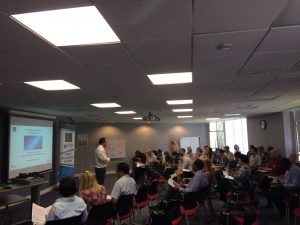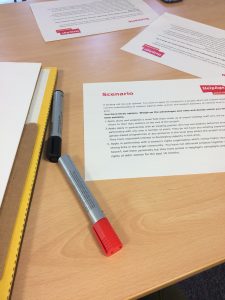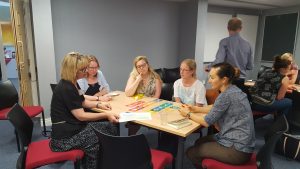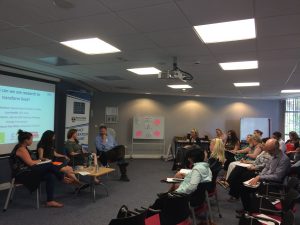Last month attendees gathered at the last of our ESRC IAA Capacity Building events this academic year to consider the different opportunities and challenges that researchers face when working with global partners. The event was in conjunction with Durham University however this was also our first collaboration with the EPSRC IAA as well, allowing for networking between staff across subject areas. The half day event with around 50 attendees began with a welcome from Professor Richard Davies, PVC for Engagement and Internationalization, who highlighted the collaborations between Newcastle and Durham Universities in terms of innovation and impact. There were other presentations from researchers that have had multiple international collaborations with different INGOS, companies and institutional partners. There was also slides presented on behalf of DFID (by Dr Elisa Lawson, Newcastle University) to set the scene in highlighting their expectations of what quality work should achieve, cost effectiveness and the impact it could potentially have.
After lunch two parallel sessions explored different themes:
The challenges and benefits of working with global partners (facilitated by Verity McGivern, Help Age International) outlined the processes and structure of Help Age International, showing the challenges faced both internally and externally by the organisation and had an interactive element where participants had to decide how they would structure a particular proposal bid. The session gave an insight into the kinds of pressures and decision-making INGOs have in both giving immediate disaster relief help and for longer term projects.
Gaming the goals (facilitated by Dr Alison Vipond, Newcastle University Institute of Sustainability) was an interactive session aimed at raising awareness of the UN Sustainable Development Goals and how they could be incorporated into research. The goals were printed on cards and individual group members were encouraged to discuss the titles that spoke to them on a personal and professional level, making the case for its importance to the rest of the group. The whole team then had to agree on one goal overall and then demonstrate how each of the goals interacted with the other. The session was relaxed and a fun way to understand more about the SDGs as well as their aims and objectives.
In the final part of the day a panel discussion was held with three external partners:
Deborah Hardoon, Deputy Head of Research, Oxfam; Lucy Kendall, CEO, CoCo; Verity McGivern, Agenda 2030 Advocacy Manager, HelpAge International and the chair was Professor Rob Wilson, KITE, Newcastle University.
The panel theme was ‘how can we use research to transform lives?’ and discussion began by pulling out the different questions around the main issues of research and how it can be used in practice by the panelists. Ideas surrounding power relations between organisations and how this must be balanced was highlighted by all the panelists including the issues of ‘co-designed’ or ‘co-governance’. How can this work in practice? Especially when researchers sometimes go to external organisations just to get the ‘stamp of approval’ rather than wanting genuine partnership. Panelists noted they would much rather have more meaningful long term relationships and would like to feed in to the process from the beginning. It was agreed that that these discussions start organically and networks and connections grow from there so it is worth spending the time building these. The measurement issue was also raised including how specific quantitative/qualitative measures can be problematic. Questions were free flowing and included responses from the audience regarding the tensions of GCRF funding and how organisations and their external partners can change the narrative of aid always being about dependency. Lucy Kendall believed that more NGO and INGOs should ‘shout louder’ to try and change the dominant stories in the press however there is also role for Universities and research to do this too, another way that research can transform discussion in the longer term.
Closing comments were by Dr Daithí Mac Síthigh, Associate Dean for Research and Innovation in the Faculty of Humanities and Social Sciences who reflected on the different themes and provocations to emerge from the day, including the importance of relationship building for the long term to help overcome challenges and for researchers to address the practicalities of global partnership with clear goals and strategies in mind. It is hoped that this event will be the first of others around this theme; the IAA capacity building will resume in September 2017. For more information on the ESRC IAA click here.




